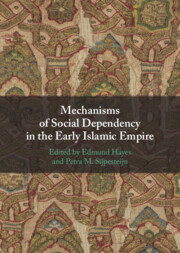Book contents
- Frontmatter
- Contents
- List of Illustrations
- List of Tables
- List of Contributors
- Notes on Transliteration, Place Names, Dates, Editions, and Translations
- Acknowledgments
- Introduction: The Ties that Bound the Societies of the Islamic Empire
- Part I Personal ties
- 1 Ties of Unfreedom in Late Antiquity and Early Islam: Debt, Dependency and the Origins of Islamic Law
- 2 The Local Clergy and “Ties of Indebtedness” in Abbasid Egypt: Some Reflections on Studying Credit and Debt in Early Islamicate Societies
- 3 ‘Return to God and the Brotherhood of Good and Excellent People’: Bringing the Prodigal Son Back Home in Ayyubid Egypt
- 4 Aloneness as Connector in Arabic Papyrus Letters of Request
- 5 Swearing Abū al-Jaysh into Office: The Loyalties of Ṭūlūnid Egypt
- Part II Institutions
- Part III Communities
- Index
2 - The Local Clergy and “Ties of Indebtedness” in Abbasid Egypt: Some Reflections on Studying Credit and Debt in Early Islamicate Societies
from Part I - Personal ties
Published online by Cambridge University Press: 06 December 2024
- Frontmatter
- Contents
- List of Illustrations
- List of Tables
- List of Contributors
- Notes on Transliteration, Place Names, Dates, Editions, and Translations
- Acknowledgments
- Introduction: The Ties that Bound the Societies of the Islamic Empire
- Part I Personal ties
- 1 Ties of Unfreedom in Late Antiquity and Early Islam: Debt, Dependency and the Origins of Islamic Law
- 2 The Local Clergy and “Ties of Indebtedness” in Abbasid Egypt: Some Reflections on Studying Credit and Debt in Early Islamicate Societies
- 3 ‘Return to God and the Brotherhood of Good and Excellent People’: Bringing the Prodigal Son Back Home in Ayyubid Egypt
- 4 Aloneness as Connector in Arabic Papyrus Letters of Request
- 5 Swearing Abū al-Jaysh into Office: The Loyalties of Ṭūlūnid Egypt
- Part II Institutions
- Part III Communities
- Index
Summary
This chapter discusses the role of Christian churchmen in the credit business and, more broadly, in creating ties of indebtedness in the early Islamic empire. With the help of a multilingual corpus of papyri from the Umayyad and the Abbasid periods, it wishes to contribute to a broader conversation about historical expressions of indebtedness in the premodern Middle East, sustained by anthropological literature on the “debt–credit nexus.” It points to the versatility and multilingualism of early Islamicate documents about debt and to their relation to a wide range of activities, going beyond impoverishment due to high taxation.
- Type
- Chapter
- Information
- Mechanisms of Social Dependency in the Early Islamic Empire , pp. 60 - 104Publisher: Cambridge University PressPrint publication year: 2024
- Creative Commons
- This content is Open Access and distributed under the terms of the Creative Commons Attribution licence CC-BY-NC-ND 4.0 https://creativecommons.org/cclicenses/

